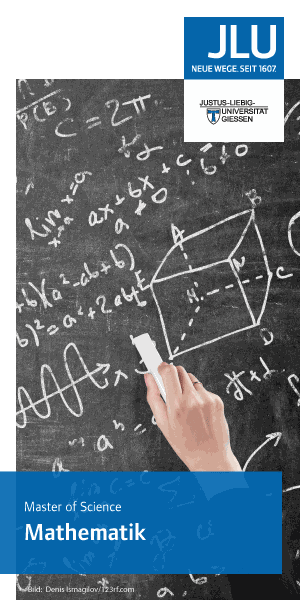Mathematics (MSc)
Taught in German
Overview
-
Picture: ismagilov/123rf.com
- Overview
-
Overview
The Master's programme in Mathematics is a consecutive programme that builds on an already acquired Bachelor's degree in Mathematics or relevant Bachelor's degrees with a broad mathematical profile. You can find more information on admission in the category "Application".
In the Bachelor's degree programme you have already become acquainted with the essential mathematical subject areas, which you will deepen in the Master's degree programme. In addition, you choose a major field of study that allows you to specialise, as well as one of the following minor subjects:
- Biology
- Chemistry
- Geography
- Computer science
- Philosophy
- Theoretical Physics
- Experimental Physics
- Economics
- Duration of studies 4 Semester 120 Credit Points (CP)
-
Duration of Studies
4 Semesters - 120 Credit Points (CP)
-
Accreditation
since 10 December 2010
Composition of the Study Programme
- Composition of the Study Programme
-
Duration of studies
4 semestes - 120 credit points (cp)
Programme structure
In the degree programme, at least 96 credit points must be acquired in mathematics modules (including thesis module) and a minor subject of at least 18 credit points must be studied in accordance with the minor subject regulations.
Mathematics modules
At least 15 credit points must be acquired in each of the areas of Algebra/Analysis/Geometry (AAG) and Applied Mathematics/Stochastics (AMS), plus at least 21 credit points in a specialisation and 30 credit points in the thesis module. A seminar or reading course module must be successfully completed, an internship module (professional field or activity field internship) can be selected.
The study specialisations can be chosen in the following areas:
- Algebra
- Analysis
- Geometry
- Numerical mathematics
- Stochastics
- Financial mathematics
Possible subsidiary subjects are:- Biology
- Chemistry
- Geography
- Computer Science
- Philosophy
- Theoretical Physics
- Experimental Physics
- Economics
In addition, supplementary modules may be freely selected if the aforementioned conditions are fulfilled.
The Master's thesis in the chosen specialisation demonstrates the ability to conduct independent scientific work and completes the degree programme.Information on the course of study and the modules
A description of the modules can be found in the special regulations for the degree programme (appendices "Course of Studies" and "Module Descriptions"). (Only available in German)
Application
- Commencement of Studies in the Winter Semester
-
Commencement of studies
Only possible in the winter semester
- Application not limited only winter
-
-
Application / Enrolment
-
The study programme is not subject to admission restrictions.
-
The enrolment period for the winter semester begins at the beginning of June.
-
The end of the enrolment period is determined anew each year, please enquire in the application portal during the enrolment period.
Different rules apply in some cases for international applicants. More...
-
-
Career Options
- Career Options
-
Perspectives
Occupational fields
It is typical for mathematics that there is no specific sector for its graduates on the labour market. Mathematicians are dependent on constantly opening up new fields of activity, which they have succeeded in doing impressively in the past. Interest in graduates has increased significantly in the last 15 years, both in industry (in the area of research and development) and in business in general, in insurance companies and banks. In numerous fields of work, it is the mathematics-typical, analytical way of thinking that excellently supports the processing of complex application problems of all kinds.
Areas:
- Data processing, actuarial mathematics and finance, logistics
- medicine, pharmaceutical industry, industrial production
- Teaching
- Public service and administration
- Detailed information can be found in the study guide
Promotion
After successfully completing a Master's degree, doctoral studies are possible.
International Giessen Graduate Centre for the Life Sciences
Graduiertenzentren:
International
- Information for outgoing students
-
-
Information and consultation
- International Office
Information and advice for studies and internships abroad (for JLU students)
Goethestr. 58, Room 22
35390 Giessen
Contact and consulation hours
- International Office
-
- Information for incoming students
-
-
Information and consultation
- International Office
General counseling of international students
Goethestr. 58, Room 38
35390 Giessen
Contact and consulation hours
- International Office
-
Further Information
- Further Information
-
- General Regulations for modularised and consecutive degree programmes at JLU
- Detailed code of regulations for this degree programme (incl. module descriptions, module plan and placement regulations) (in German)
- The detailed code of regulations and an information leaflet can be found as PDF documents in the download section (on the right)
- Master's Degree Programmes of Faculty 07
Contact
- Subject Advisors
-
Prof. Dr. Oleg Davydov
Heinrich-Buff-Ring 44, HRZ, room 117
35392 Gießen
Phone: 0641 - 99 32192
E-mail: Oleg.DaydovProf. Dr. Klaus Metsch
Mathematisches Institut
Arndtstr. 2, room 116
Phone: 0641 - 99 32082
E-mail: Klaus.Metsch@math.uni-giessen.deInformation concerning office hours can be found here.
- Contact
- Beate Pitzler

